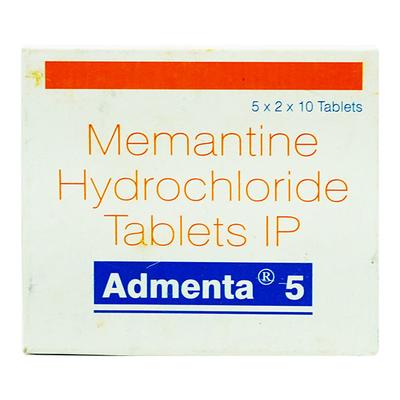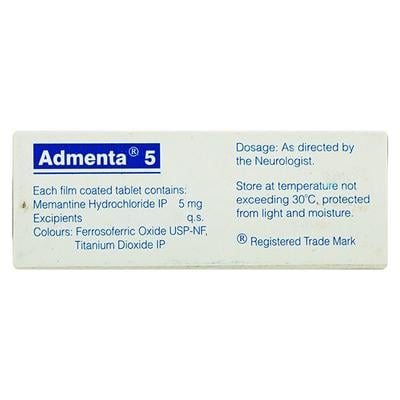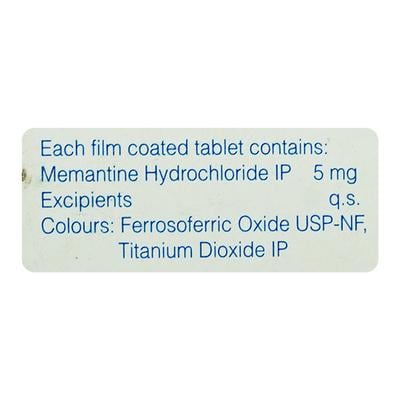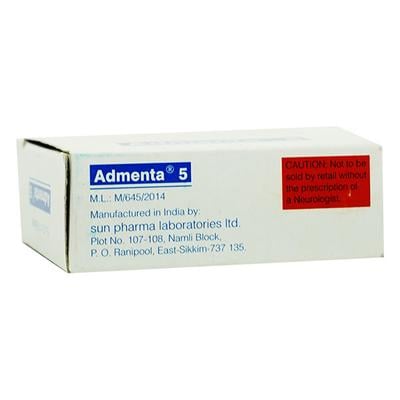

Netmeds First Membership
Quick Links
Introduction About ADMENTA 5MG TABLET
Admenta 5mg Tablet: Detailed Overview
Admenta 5mg is used to manage moderate to severe Alzheimer’s disease. It supports memory, thinking, and cognitive function in Alzheimer's.
Alzheimer’s disease is a neurodegenerative disease that destroys memory and other important mental functions in an individual. It is caused due to formation and accumulation of certain toxic proteins in the brain that destroys brain cells. It can be characterized by loss of memory and forgetfulness of day-to-day activities.
Admenta 5mg Tablet contains Memantine, an NMDA receptor antagonist that helps regulate nerve signals in the brain involved in learning and memory. By modulating the activity of glutamate and other neurotransmitters, it helps maintain cognitive processes and mental clarity. This mechanism supports the management of conditions with memory and thinking difficulties over time.
Admenta 5mg Tablet should not be used in pregnant or breastfeeding women. It is also not suitable for use in children aged below 18 years. It should be used with caution in the elderly patients.
Inform your doctor of any other medications or health conditions before starting Admenta 5mg Tablet. If dizziness, headache, or other side effects persist, consult your healthcare provider.
Key Composition
- Active Ingredient: Memantine 5mg
- Purpose: Supports cognitive functions associated with moderate to severe memory decline conditions
- Form: Oral tablet, easy to swallow
- Packaging: Available typically in strips of 10 tablets
Uses Of ADMENTA 5MG TABLET
- Manage moderate to severe Alzheimer’s disease
Benefits of ADMENTA 5MG TABLET
- Helps improve cognitive functions such as memory, thinking ability, and mental alertness in individuals with moderate to severe Alzheimer's disease
- Slows down the progression of Alzheimer's symptoms, enabling patients to maintain daily activities and improve quality of life
- Works by regulating abnormal brain activity through NMDA receptor antagonism, reducing the effects of toxic chemicals that damage brain cells involved in memory and reasoning
- Enhances ability to focus, learn, and process information, which may help in managing forgetfulness and confusion associated with dementia
- Suitable for long-term use under medical supervision to provide ongoing support for cognitive functioning
How ADMENTA 5MG TABLET Works
Admenta 5mg contains Memantine, an NMDA receptor antagonist that helps regulate nerve signals in the brain involved in learning and memory. By modulating the activity of glutamate and other neurotransmitters, it helps maintain cognitive processes and mental clarity. This mechanism supports the management of conditions with memory and thinking difficulties over time.
Why Admenta Supports Memory and Thinking?
Admenta 5mg supports memory and thinking primarily through its action as an NMDA (N-methyl-D-aspartate) receptor antagonist. It works by regulating glutamate, a key neurotransmitter involved in learning and memory, whose excessive levels can lead to neuronal damage and dysfunction in Alzheimer's disease. By blocking excessive glutamate activity at NMDA receptors, Admenta helps protect brain cells from excitotoxicity, a process that causes nerve cell damage and contributes to cognitive decline.
This selective regulation of glutamate activity helps restore a healthier balance of nerve signaling, slowing the progression of memory loss, confusion, and impaired thinking associated with Alzheimer's. It improves cognition by enhancing synaptic plasticity and reducing the abnormal overactivation of nerve cells, thus supporting better memory, focus, and mental function in patients with moderate to severe dementia. Although it does not cure Alzheimer's, Admenta helps reduce symptom deterioration and supports daily cognitive abilities.
How to use ADMENTA 5MG TABLET
1. Usage Guidelines of Admenta 5mg
- Take Admenta 5mg as advised by your healthcare provider, typically once daily
- Swallow the tablet whole with water, with or without food
- Maintain a consistent medication schedule for effective results
- Do not discontinue the tablet abruptly without consulting your doctor
2. Recommended Dosage of Admenta 5mg
- The typical starting dose is 5 mg orally once daily. This helps the body adjust to the medication gradually.
- It can be taken with or without food, preferably at the same time each day to maintain consistent blood levels.
- The tablet should be swallowed whole with water without crushing or chewing.
3. Dosage increase and titration schedule
- The dose is usually increased by 5 mg increments each week based on tolerability and clinical response
- The target maintenance dose is generally 20 mg per day, divided as 10 mg twice daily after titration
- Some patients may require slower titration depending on their individual response and side effects
- Dose adjustments may be necessary in patients with kidney impairment or other health conditions, hence always follow your doctor's guidance.
What if I forgot to take ADMENTA 5MG TABLET
- Take the missed dose as soon as you remember
- If it is almost time for your next dose, skip the missed one, do not double up doses to catch up
- Maintain your regular dosing schedule thereafter to keep steady medication levels
- If multiple doses are missed, consult your healthcare provider about restarting or retitrating the medication
Overdose
- If you or anyone else accidentally took more Admenta 5mg Tablet, consult your doctor immediately or visit the nearby hospital
- Symptoms of overdose might include feeling tired, slow heart rate, confusion, dizziness, increased blood pressure, feeling faint, psychosis, feeling agitated, restless or sleepy, slowed movement, unsteady movements, hallucinations, sensation of spinning and vomiting.
Side Effects Of ADMENTA 5MG TABLET
Common
- dizziness
- headache
When to consult a doctor?
- self-harming thoughts
How To Manage Side Effects
Dizziness Or Drowsiness
Try to rest and relax. Get enough sleep. Avoid driving or operating any tools or machines completely while you are feeling dizzy. Consult your doctor if your dizziness worsens.
Headache
Rest and relax. Keep yourself hydrated by drinking plenty of fluids such as water or electrolytes. Applying a pain-relieving balm on your forehead can be beneficial. Do not consume excessive alcohol, as it could aggravate your headache. Consult your doctor if your headache worsens.
Warning & Precautions
Pregnancy
ContraindicatedAdmenta 5mg is not recommended for use in pregnant women.
Breastfeeding
ContraindicatedAdmenta 5mg is not recommended for use in breast feeding women.
Driving and Using Machines
Use with CautionDo not drive or operate heavy machines if your ability is affected by Admenta 5mg
Alcohol
Consult your doctorAvoid consumption of alcohol while taking Admenta 5mg as it might make you feel dizzy or drowsy.
Kidney
Use with CautionAdmenta 5mg should be used with caution in patients with kidney problems.
Liver
Use with CautionAdmenta 5mg should be used with caution in patients with liver problems.
Allergy
ContraindicatedDo not take Admenta 5mg Tablet if you are allergic to Memantine or any other ingredients of this medicine.
Heart Disease
Use with CautionAdmenta 5mg Tablet should be used with caution in patients with heart problems (such as congestive heart failure, uncontrollable high blood pressure or a recent heart attack).
Use In Pediatrics
ContraindicatedAdmenta 5mg Tablet is not recommended for use in children and adolescents (below 18 years).
Use In Geriatrics
Use with CautionAdmenta 5mg Tablet should be used with caution in elderly patients (65 years and above).
Other Warnings for ADMENTA 5MG TABLET
Before taking Admenta 5mg Tablet, inform your doctor if you have,
- history of epilepsy
Diet and Lifestyle Advice
Improving Quality of Life
- Encourage participation in regular physical activities such as walking, dancing, or gentle strength training, which help maintain independence, support cardiovascular health, and improve emotional well-being
- Promote pleasant events and meaningful activities such as social gatherings, hobbies, music or pet therapy to boost mood and reduce depression.
- Establish daily routines for meals, rest, and activities to create stability and reduce anxiety or confusion.
Supporting Cognitive Functions
- Engage in mentally stimulating activities like puzzles, reading, learning new skills, or board games to build cognitive reserve and delay symptom progression.
- Follow a balanced, brain-healthy diet such as the Mediterranean or MIND diet, emphasizing vegetables, fruits, whole grains, lean proteins, and healthy fats.
- Prioritize sleep hygiene with regular bedtimes and a calm environment to protect memory and cognitive abilities
- Combine social engagement and cognitive stimulation, as socializing also improves communication and mental agility
Caregiver Support
- Utilize structured routines, reminders, and task simplification to help loved ones participate actively while maintaining dignity
- Seek education and support from occupational therapists or community resources to enhance caregiving skills and reduce burden
- Join caregiver support groups, ask for help, and maintain open communication with family or professionals to share the caregiving load
- Be patient and use positive communication strategies, regular self-care and emotional support for caregivers are essential to sustaining effective care
Drug - Drug interaction
Interaction Precautions: Medicines to Avoid with Admenta
- NMDA Antagonists: Avoid using other NMDA antagonists such as amantadine, ketamine, and dextromethorphan, as combining them with Admenta can increase toxicity and adverse effects like dizziness, agitation, and confusion
- Antacids Containing Sodium Bicarbonate: These can increase the blood levels of memantine by altering renal excretion, potentially leading to toxicity
- Carbonic Anhydrase Inhibitors: Medicines like acetazolamide, methazolamide, or zonisamide may increase memantine levels by affecting its renal clearance
- Certain Cardiac Medicines: Including anti-arrhythmics like procainamide and quinidine, and diuretics such as hydrochlorothiazide; these may interact and require close monitoring
- Other CNS-Acting Drugs: Including skeletal muscle relaxants, antipsychotics, anticonvulsants, and barbiturates, which may enhance side effects such as dizziness and sedation
Drug - Food interaction
- No major food interactions with Admenta 5mg
- Can be taken with or without meals
- Avoid or monitor use of sodium bicarbonate-containing products with memantine
- Maintain consistent dosing time for best results
Synopsis
| Drug | : | Memantine |
| Pharmacological Category | : | N-methyl-D-aspartate (NMDA) receptor antagonist |
| Therapeutic Indication | : | Alzheimer’s disease |
| Dosage Forms | : | Tablet |
More Information
Storage
- Store in a cool, dry place away from direct heat and moisture
- Keep all medicines out of the reach of children
FAQs About ADMENTA 5MG TABLET
Q: How does Admenta 5mg support cognitive health?
A: Admenta 5mg supports cognitive health by acting as an NMDA (N-methyl-D-aspartate) receptor antagonist that regulates glutamate activity in the brain, a neurotransmitter essential for learning and memory.
Q: What are the best practices for medication adherence?
A: Set a consistent routine, use reminder tools, simplify the regimen, understand your treatment, communicate with healthcare providers and involve support systems.
Q: How to verify medicines for authenticity online?
A: Purchase only from reputable, licensed online pharmacies that require a prescription and display certification seals like VIPPS or have a “.pharmacy” domain indicating verified status. Examine the medicine packaging for security seals that are intact and tamper-free. Look for consistent font, color, spelling of brand and manufacturer names compared to previous purchases. Some manufacturers include QR codes or serial numbers on packaging which you can scan or enter on official websites or apps to confirm authenticity instantly.
Q: What should be monitored during use of Admenta 5mg?
A: Periodic assessment of memory, thinking ability, and daily functioning to evaluate therapeutic benefits and disease progression. Admenta may cause high blood pressure in some patients, so regular monitoring of blood pressure levels is advised. Closely observe for potential interactions with cardiac drugs (e.g., anti-arrhythmics, diuretics) and avoid concurrent use of other NMDA antagonists such as amantadine or ketamine.
Q: Is Admenta 5mg addictive in nature?
A: No. Admenta 5mg is not addictive in nature. However, consult your doctor if you experience any unusual withdrawal symptoms.
Q: How and when ADMENTA 5MG TABLET should be taken?
A: Take Admenta 5mg as advised by your doctor. It can be taken with or without meals. Swallow the medicine with a glass of water. Do not crush or chew the medicine. Try to take Admenta 5mg at the same time each day.
Q: How long should I use ADMENTA 5MG TABLET to see the results?
A: Take ADMENTA 5MG TABLET until your doctor advises you to stop. Research shows that it may take around 6 months for ADMENTA 5MG TABLET to show results in the affected patients. However, this period may not be the same for everyone. It differs from patient-to-patient depending upon the severity of the disease.
Q: Can ADMENTA 5MG TABLET be used to enhance memory in children?
A: No. ADMENTA 5MG TABLET is not a memory enhancer. It only manages the destruction of brain cells that carries memories in the aging people. It is not suitable for use in children and adolescents (under 18 years) to enhance memory.
Q: Can I stop taking ADMENTA 5MG TABLET without consulting the doctor once I feel better?
A: Do not stop taking ADMENTA 5MG TABLET without consulting your doctor. There is no manage for Alzheimer’s disease. Medicines are available only to manage its symptoms, and so discontinuation of the therapy may make your symptoms to reappear once again. However, if you feel that your symptoms have disappeared, consult your doctor for advice.
Q: Can ADMENTA 5MG TABLET make me feel sleepy?
A: Yes. ADMENTA 5MG TABLET may make you feel sleepy. If you feel sleepy, rest, and relax. Restrict yourself from doing activities that may put you in danger. Avoid driving or handling heavy tools or machines.
Q: What happens when ADMENTA 5MG TABLET is taken along with hydrochlorothiazide?
A: Avoid taking ADMENTA 5MG TABLET with hydrochlorothiazide as it may reduce the effectiveness of this medicine.
Q: Can ADMENTA 5MG TABLET be used in pregnant women?
A: ADMENTA 5MG TABLET is not recommended for use in pregnant women and in those who are planning to become pregnant.
Q: Can ADMENTA 5MG TABLET cause headaches?
A: Yes. ADMENTA 5MG TABLET may cause headache in some individuals. In case of you are experiencing a headache after taking the medicine, try to rest and relax. Drink plenty of fluids such as water or electrolytes. Apply a pain-relieving balm on your forehead if needed.
Q: What can be done if I forget to take a dose of ADMENTA 5MG TABLET?
A: If you forget to take a dose of ADMENTA 5MG TABLET take it as soon as you remember. However, skip the missed dose if it is time for the next dose. Do not take a double dose to make up for a forgotten dose.
References
1. K.D Tripathi. CNS Stimulants and Cognition Enhancers. Essentials of Medical Pharmacology. Seventh edition. 2013. Page - 490.
2. Shinji Matsunaga, Taro Kishi, Ikuo Nomura, Kenji Sakuma, Makoto Okuya, Toshikazu Ikuta, Nakao Iwata. The efficacy and safety of memantine for the treatment of Alzheimer's disease. NIH: National Library of Medicine, National centre of biotechnology Information Pubmed.gov. October 2018. [Accessed on 6th November 2025] ![]()
3. Forest Pharmaceuticals, Inc. U.S. Food & Drug Administration. [Revised in October 2013] [Accessed on 6th November 2025] 











